
Rachel Carr is a GB Climbing Performance Development coach who will shortly be travelling to Paris to support our four qualified athletes. Originally from Edinburgh and now based in Sheffield between competition travels, Rachel is a former GB Climbing athlete and has worked her way up the coaching ranks from local to international levels in a male-dominated vocation.
I've always had a huge amount of faith in this team and what the athletes can do at any comp, and I think this is one of the few times where it actually worked out, and more! - Rachel on the Olympic Qualifier Series
Paris 2024 is set to be a record-breaking Games for women's participation as the first Olympiad to achieve gender parity, with an equal number of quota places for men and women. The percentage of female coaches across all sports at Olympic Games has grown steadily from 11% in London 2012 and Rio 20216 to 13% in Tokyo, while the projected figure for Paris 2024 is at around 25%.
This year, UK Sport reported that 20% of Team GB's Paris-bound coaches will be women - double the percentage (10%) who worked at Tokyo 2020.
While these increases are promising, female coaches will remain a small minority in what has been dubbed the #GenderEqualOlympics.
Rachel will be among these women, working alongside fellow GB Climbing coach Liam Briddon. We sent her some questions about her climbing, coaching work, representation and how she feels about the upcoming Olympic Games.
How and when did you get into climbing?
I got into climbing when I was 11 when my mum's friend took me for the first time and I became obsessed straight away.
How did you get into coaching?
My mum encouraged me to start mentoring younger kids at my local wall to offer them support from my experiences as a GB athlete. Around the same time I became Team Captain of the GB Junior Bouldering Team and was doing some similar mentoring and supporting of younger athletes, when I realised that I had a lot to offer and could make a real impact on people.
What do you enjoy about it?
For me it's incredibly rewarding. I love competitions and the environment and inspiration they bring, so to be part of it still when I wasn't cut out for competing is incredible. People love to watch journeys and see people grow, and I'm no different. It really feels like an honour to be part of an athlete's growth and journey to achieve their dreams. You get to experience so much joy, so many wins or achievements of so many athletes, but you also get to be there for people when they don't win, when they struggle and find it hard.
I can be the reason someone finds or maintains belief in themselves enough to keep pushing and fighting for their dreams. I can be the voice that keeps the anxieties at bay or reminds them why they do this. It's so fun to get to be at the competitions, see the crowd and all the young athletes dying to meet their idols, but the best part about it is knowing the impact that you can have on someone's career or life just by reminding them that you are invested and believe in them. My most rewarding moments are when an athlete is disappointed in their performance, and I am able to bring them back around to realise the bigger picture or make the changes to get them success in the future.
How is your personal climbing going, and how does it inform how you work with your athletes?
I'd be lying if I said it's where I want it to be, but something has to be sacrificed to commit to these athletes on this journey. Travelling to all the competitions and trainings means often missing out on training sessions and carrying some injuries from the inconsistencies, but usually in every off season I manage to pull it back enough to enjoy a couple rock trips and keep pushing my limits. For me the level I'm at isn't that important, though having the strength to do some similar movements does allow me to have a better understanding of how muscles work and feel doing them, which I find helpful for teaching athletes to better understand it themselves.
The most useful part is understanding the dedication and trying to maintain as much dedication as possible myself. I don't think I could tell an athlete to keep training and fighting through fatigue if I gave up every time my training got hard as it would feel false. It's a purely personal thing but I think pushing my limits - both physical and mental - in my climbing is what allows me to push myself in my coaching. I try to be transparent and honest about my growth and abilities in my coaching in order to encourage athletes to do the same and that wouldn't be possible if I carried an unhealthy ego that was too afraid to try and fail or quit when things get hard. Saying that, I know I don't train anything close to what the athletes do, but I do the best I can with the time I have, and I do the things I'm bad at as often as possible.
How does the GB Climbing coaching setup work: do you work with both specific athletes and as a group? How much time do you spend with the athletes away from events in training?
The set-up has changed over the years due to budget constraints, but there are currently three full-time coaches who are there for the programme. I am one of the senior programme coaches so technically any athlete in the senior programme can get a training plan or coaching sessions from me if they want (same for the other two coaches). The reality of this is that most of the senior team already have established set-ups that work very well so there is no need to change anything. This means I only work with a small number of senior athletes, but also get to offer some support to junior athletes with the spare time I might have. I try to see the athletes I work with weekly for sessions, for some its multiple times a week. I write training plans for them and try to check in regularly when competitions are happening.
As a programme we would usually have some training sessions as a team throughout the year as well (depending on budget) which we have only managed to do a few of this year with the OQS and Olympic athletes.
It seems like GB Climbing is hosting and attending more training camps in the UK and abroad. How do these benefit the athletes?
I think it's made a huge difference to have access to appropriate levels and styles in the pre-season. Ideally all international athletes would have this level of access to prep them for comps better as we find quite often that a lot of them are competing on holds, moves and styles they don't have easy access to at their local walls, especially those from further out cities with smaller walls and fewer setters. It's hard to go to a competition with the confidence and ability to understand moves that you've only seen a handful of times before - not impossible, but far more challenging.
What different roles/duties does a coach have to fulfil at a competition?
At a competition a coach will have a number of roles. In the days leading up to the comp you help the athletes prepare by taking them to training walls (which in some places is a real challenge with limited access). In these sessions it's super important to ensure the athlete is feeling good, which can either mean a lighter session where they succeed a lot, or for some athletes, getting them on crazy moves that give them plenty of challenge. It's about knowing what each individual needs and supporting that. You usually then do a pre-comp brief with them to check what they need from you on comp day and how they are feeling.
Then at the comp itself you are either back of house or front of house. Back of house is when you stay in isolation until our last athlete is out, chatting, warming them up, letting them know about timings or changes to be aware of that might affect their start time - again it's really about whatever the individuals need. Front of house goes out at the start of the round or with the first of our athletes. They film each athlete and often others, ready to make appeals when judging is done incorrectly or something has been missed on the scores. Between rounds or after comps are finished we will also generally do debriefs with any athletes who want them. This can factor into training plans and comp plans if things need to change, or can just be the necessary recognition of small successes following training.
Do you provide psychological coaching support, or is there access to sports psychologists and other support staff for the GB athletes?
I would say that we provide a lot of emotional support, but quite often athletes struggle with mental health, as is common in elite sport. In these instances, I regularly encourage athletes to speak to psychologists to ensure the best support possible. We currently don't have the funding for sport psychology support, but any athletes on programmes like TASS or UK Sport individual funding have access to this.
What challenges does the combined Boulder & Lead format present for athletes and your coaching?
I'd say it's easier than it was to include Speed as that took a huge toll on their bodies due to the variety of training required to excel in all three. But the biggest thing is often the time it takes to train for both now. Bouldering involves a lot of power and skill which means a lot of repetition and strength work to be strong enough to learn and execute the techniques in the time limit, and lead involves a huge amount of strength, body control and endurance. So, a lot of the athletes are spending nine hours a day, six days a week at walls training.
What were your hopes before qualification started: did you expect to have four GB athletes qualify for Paris [Toby Roberts, Erin McNeice, Hamish McArthur and Molly Thompson-Smith]?
I remember having conversations at the start of the off-season saying I believed we could get three there if not four. I just knew that all of them had the potential to qualify plus a couple more. At the time it was maybe closer to stubborn optimism or a bit of overconfidence in what differences we could make with a good winter of training.
I've always had a huge amount of faith in this team and what the athletes can do at any comp, and I think this is one of the few times where it actually worked out, and more! There came a point where it was actually scary to say 'I think we can get four' because I knew there would be a huge amount of heartbreak that would follow if we didn't for so many of us. Right before Shanghai, or even between the two rounds it was clearly possible for all of them to make it, but you never know what can happen. Even when we were 98% sure all four had qualified there was still fear that we'd got it wrong right up until they were called onto the stage for the official announcement.
What do you put the success of the team down to?
I think a huge amount of focus has taken place over the past four years with these athletes. The coaches (both programme and personal) have put in countless hours, travelled all over the world and done whatever it takes for the athletes to get to this point. As a team, we have spent 4 years implementing strategies to create the best coaching set-ups at comps as possible to allow as many of the athletes to thrive as possible. We've arranged several trainings with international and national setters and athletes, and developed our staff with every year to ensure continuous growth. Bringing on Max Ayrton as a part-time setter to develop the setting pathway and use his knowledge, skills, and international connections to put together some incredible comps and trainings has been invaluable to the athletes ahead of these comps.
Each of the coaches have been on one if not multiple UK Sport and UK Coaching development courses to ensure we knew as much and were as prepared as possible to support athletes at this level. I'm not sure I could possibly put it down to one thing as I truly believe that each aspect of the strategy has contributed to the success, whether it be the comps, coaches or training, it's all key to development. All I know is it wouldn't be possible without athletes who put their trust in us as coaches and allowed us to do what we thought was best for them even if they didn't like it at first. Without determined athletes, nothing else would matter.
You've worked quite closely with rising star Erin McNeice. What are her strengths as an athlete?
For me her strengths aren't just physical. I think her determination and almost stubbornness have been the key to her success. She is never satisfied with failing at something, even if there is a perfectly reasonable explanation for why she was unable to do it, she won't accept it and wants to do whatever it takes to do it next time. But at the same time, she is one of very few athletes who can decide to go out and enjoy being on the mats. Even after the hardest boulder she can check in with herself to remember why she's there and go out genuinely smiling on the next one just making the most of every moment. In training, she is more likely to do something if I say she can move on, I can make it easier, or even that it might not be possible.
She is certainly strong, with crazy lock off strength, but that's due to the hours in the gym day in and day out. As well as that, her ability to understand and execute complex coordination is so impressive. She has a lot of power and skill that has really helped her out this year, but again, that's due to hundreds of sessions spent in gyms making up crazy eliminates, wild moves and doing super boring and bizarre gym exercises to have the physical ability to do so. Her training capacity is super high and she makes sure we give her the training to fill it. She is harder on herself than anyone else but also believes she can do anything, and the times when she doesn't she lets me in to remind her of that. She trusted us to make a huge change to her coaching set-up by bringing in another coach and working with me more regularly but I think its safe to say that trust paid off massively.
You are good friends with Molly Thompson-Smith. What was it like to follow her journey, watch her qualify and be heading to the Games together?
It's really a dream come true for me. She has had one of the hardest journeys out there, come back from so many knock backs and challenges and is still one of the most resilient and consistent athletes out there. It's not been easy to manage the balance of friendship and professional at times and I have definitely made some mistakes with this. But to have been there for a lot of her toughest results and now get to be there as her friend for this has been incredible. I won't pretend that I had anything to do with her success, but even just getting to see it in person has been so rare. I am so proud of her and everything she has achieved; she is so strong and determined and deserves this so much. I'm really just looking forward to experiencing all of the exciting non-competition stuff at the Games with her - it really will be a once-in-a-lifetime opportunity and I cant wait for her to have her moment on that stage.
What would you say your strengths are as a coach?
I like to think I'm quite empathetic. I can often understand where most people are coming from, what they might be feeling or experiencing at times and I think this helps me to help them through the tough times and make the most of the good times in a way that really helps to build them up as an athlete. I try to be really balanced, never being overly positive or negative about anything so they can form their own views, but simply providing them with context to do so. I do also think that my years of competing combined with the sheer number of years involved in top-end competition climbing has given me a pretty good understanding of movement that helps athletes learn new skills and climb as well as possible, hopefully making them quite well-rounded.
I just asked Erin what she thought and she said that I'm 'consistently dedicated throughout the year and push her where others have been too scared to but in a supportive environment which she feels she can trust.'
What are the hard parts of the job?
Honestly, the external politics that come with being an NGB. GB Climbing hasn't been perfect but we have tried incredibly hard to do the best we can with what we have and for the most part it's gone well. The coaching team have dedicated a huge amount of our lives to this team of athletes and any past athletes. We are held to a much higher standard than most and yet often go unappreciated and undervalued.
What challenges have you overcome in your coaching journey?
I have suffered from a lot of imposter syndrome. I've often been the youngest coach and one of very few females in most spaces, combined with most of my experience being in the role rather than formal education, it's hard to feel like I belong or have confidence that I'm doing the right things. I've had to do a lot of work to believe in myself and put myself out there in challenging spaces. I do believe it is a blessing at times though as questioning everything I do helps me ensure that I stick to my values, and do things for the right reasons. I always encourage any athlete or other coach to question me for this exact reason: if I can't tell them why I've made a decision in a way that they then understand the process completely, then I change it.
What are your career highlights?
It's hard not to pick where I am now. Coaching an athlete to two World Cup finals and now an Olympics. Being part of the Olympic coaching team. Being one of the youngest coaches on the circuit (maybe the youngest)...and getting to watch Toby win all three of his World Cup gold medals from the pit.
Who or what inspires you in your coaching work?
Genuinely - the athletes. I've looked up to other coaches like Jen Leeming but nothing gets me more psyched or inspired than when I watch the athletes putting in the hours or laying down an impressive performance. If they are motivated then it makes me incredibly motivated.
How much support do you get as a coach (professional development, opportunities to learn from other sports?)
Through my role in the team I've had access to several UK Sport and UK Coaching opportunities as well as working with a coach developer for most of my years. In those I've shadowed coaches from a number of sports, heard from incredibly successful UK Coaches about their experiences and advice and had mentors and groups to bounce off and work with as well.
How would you describe the future of GB Climbing - how can you support up-and-coming talent ahead of LA28?
Super promising. There is a huge amount of up and coming talent in the younger categories who will hopefully be super impressive as they develop as well. Hopefully we are able to provide them with enough advice and training to help them grow and continue to compete as they get close to the next Games.
What advice would you give to someone interested in becoming a climbing coach?
Don't assume you need to know a lot to get started, but also assume you know nothing so you actually learn. If you are good with people and motivated to make a difference to someone, then start small and learn with an athlete as they grow. I also found it super helpful having other coaches to bounce off so have started mentoring a couple of young coaches who I used to coach as athletes in Edinburgh - if you can find someone similar then lean into them as much as possible.
What is your specific role in Paris? What are the additional challenges for coaches and athletes at an Olympics?
I will function as both back and front of house and be in the Village with the athletes. I'm a team coach there to support all the athletes on the team and work with any home coaches unable to get accreditation (limited number). The challenges are mainly the unknowns, with all of us being first timers we don't quite know what to expect other than the information given, so until you actually go and experience it yourself it's hard to be fully prepared. A lot of people have prepped us by telling us that there's a lot going on and to just be prepared for the village itself. It will be an experience unlike any other competition, but hopefully if we can focus on making the most of it then it won't be too stressful. Honestly, my biggest concern is how far I'll have to walk to get food every day: I like to snack.
What are your hopes for the team in Paris?
I'm of course hoping for a medal, but I think they all have a chance of making a final. I just hope they can all go and leave it all out there with no regrets.
What are you looking forward to the most?
I think it's going to be an unforgettable experience. It really is special to say you've been to an Olympics even as a coach, so I'm looking forward to taking it all in and making as many memories as possible.
- How did the Paris 2024 Olympic Games impact Sport Climbing Athletes' Instagram Following? 4 Sep
- ARTICLE: Meet the Paris 2024 Olympic Routesetters Part 3: Olga Niemiec, Boulder 4 Aug
- INTERVIEW: Meet the Paris 2024 Olympic Routesetters Part 2 - Martin Hammerer, Lead 1 Aug
- ARTICLE: Sport Climbing at Paris 2024: Schedule and How to Watch 30 Jul
- INTERVIEW: Meet the Paris 2024 Olympic Routesetting Team - Garrett Gregor 29 Jul
- ARTICLE: Q&A with New BMC President Dominic Oughton 18 Jul
- ARTICLE: Climbing Moves We Might See in the Paris 2024 Olympics - and How to Do Them 9 Jul
- ARTICLE: 12 Sport Climbing Highlights to Look Forward to in the Paris 2024 Olympic Games 27 Jun
- ARTICLE: Nuts Museum: The Frenchman who collects Trad Climbing Gear 7 May
- SKILLS: Top Tips for Learning to Sport Climb Outdoors 22 Apr











































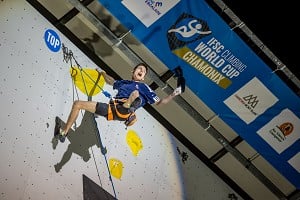
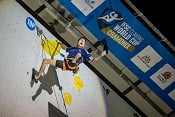
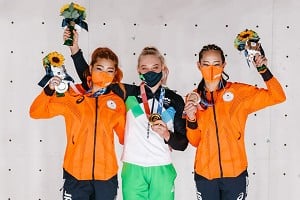
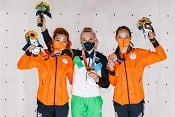
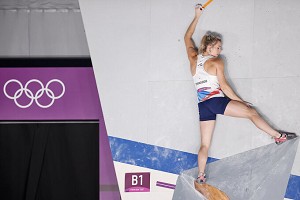
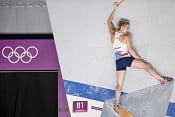
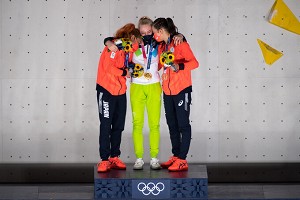

Comments
Hell yeah Rach.
As much as the athletes have earned their place in the Games, you've earned yours as a coach doubly so. Rooting for you all from Wales.